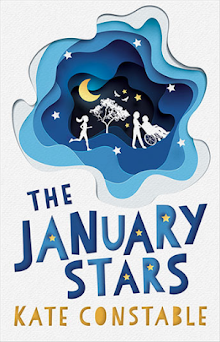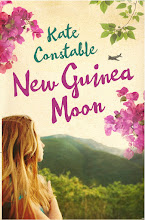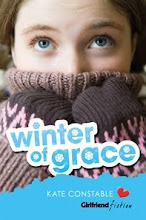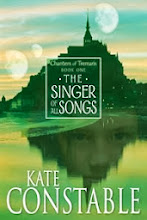29.11.16
More Emily!
Emily Climbs sees our friends and relations from New Moon relegated to the background as Emily goes off to high school in Shrewsbury, boarding with her prim, judgmental Aunt Ruth, forming new friendships and setting out on her 'Alpine path' -- her writing career. The book ends with a potentially life-changing offer from a fairy godmother figure; but can Emily tear herself from her beloved New Moon?
Spoiler: she doesn't! Emily's Quest is in many ways the saddest of the trilogy. Where Emily of New Moon is fresh and sweet, and Emily Climbs is hopeful, Emily's Quest is a book of disillusionment, misunderstandings and disappointment. This final novel sees the tangle of relationships between Emily, Teddy, Ilse and Perry (and the creepy Dean!) which was set up in the first book, play out in full. There are moments of joy, where Emily has her first book published, and she has plenty of offers of marriage, but of course we know that no one will do for our Emily but Teddy... But Teddy is going to marry Ilse! How are they going to get out of this one?
I think I prefer the first two books, before Emily gets sad and lonely, even though it all works out in the end. In some ways the last book feels rather perfunctory, as if Montgomery had decided well in advance how the story was going to end but almost lost interest before she came to actually write it (dear readers: this can happen.) There is quite a bit of Tell-Not-Show and the quirky character studies and amusing anecdotes are less prominent, and as I get older I find that these are the parts of Montgomery's writing that I enjoy the most. It's still a lovely trilogy though!
21.11.16
Comfort Re-Read: Emily of New Moon
I grew up with Anne of Green Gables, but I didn't find Emily until quite recently (thanks to dear Suzanne from book group, who shares my tastes!). I've been in the mood for something non-threatening and sweet, and Emily fits the bill perfectly.
There are certainly parallels with Anne's story -- eccentric, gifted orphan girl lands in a household where she is not at first entirely welcome, wins over her guardians, makes friends and communes with nature as life's lessons help her to mature -- but Emily is quieter than Anne. Instead of a fiery temper and impulses that land her in scrapes, Emily has a steely determination and a gift for poetry (surely at least in part a self-portrait of the author?)
There were a couple of aspects of the story that made me cringe slightly. There is a frankly creepy friendship with a thirty-five year old man (Emily is twelve) who comes across like a grooming paedophile (he says, rather ominously, that he'll 'wait for her' -- yuk!) and the story of Emily's friend Ilse, completely neglected, even disliked, by her father, because he's under the impression that her mother betrayed him, just makes my blood boil! The morality of the day has not aged well. It was chastening, too, to read about children dying of measles. This is why we have vaccination, people!
But on the whole, this was a quick, delightful re-read.
There are certainly parallels with Anne's story -- eccentric, gifted orphan girl lands in a household where she is not at first entirely welcome, wins over her guardians, makes friends and communes with nature as life's lessons help her to mature -- but Emily is quieter than Anne. Instead of a fiery temper and impulses that land her in scrapes, Emily has a steely determination and a gift for poetry (surely at least in part a self-portrait of the author?)
There were a couple of aspects of the story that made me cringe slightly. There is a frankly creepy friendship with a thirty-five year old man (Emily is twelve) who comes across like a grooming paedophile (he says, rather ominously, that he'll 'wait for her' -- yuk!) and the story of Emily's friend Ilse, completely neglected, even disliked, by her father, because he's under the impression that her mother betrayed him, just makes my blood boil! The morality of the day has not aged well. It was chastening, too, to read about children dying of measles. This is why we have vaccination, people!
But on the whole, this was a quick, delightful re-read.
18.11.16
The Brain That Changes Itself
I've been meaning to read The Brain That Changes Itself for ages, especially since Dad had his stroke -- it's very pertinent to the problems he has been facing (partial paralysis and aphasia). It's become a bit of a modern pop-science classic since it was first published in 2007; this was an updated edition from 2010 and I'm sure the science has advanced even further in the last few years.
I think I was expecting more of a focus on stroke treatment, but Norman Doidge covers a range of brain injuries and human issues -- there's one chapter on sexual attraction, and one on psychoanalysis, as well as stroke, OCD, phantom limbs and pain. Doidge's central thesis is that the brain's functioning is not fixed, but is capable of incredible feats of 'plasticity,' adapting and modifying itself to cope with injury, expanding neural networks as we learn and reinforce that learning (as when we learn an instrument or a new language, or as blind people use the parts of the brain normally used for visual processing to enhance their hearing instead.)
I have a weakness for pop-science books and this one was particularly relevant to my interests. Doidge is very encouraging about the human capacity for recovery from brain injury, and we have seen for ourselves the amazing advances that my father has made since his massive stroke 18 months ago. He can now stand steadily, walk for short distances with a quad cane, and has improved his mental processing with the help of brain exercises from our wonderful speech pathologists. (Though I was a bit disconcerted to read in a footnote this morning that there's evidence that people recovering from stroke can improve either their physical movement or their cognitive function -- but there just isn't enough capacity in the undamaged brain to cover both. I don't think I'll be sharing that particular speculation with Dad.)
I think I was expecting more of a focus on stroke treatment, but Norman Doidge covers a range of brain injuries and human issues -- there's one chapter on sexual attraction, and one on psychoanalysis, as well as stroke, OCD, phantom limbs and pain. Doidge's central thesis is that the brain's functioning is not fixed, but is capable of incredible feats of 'plasticity,' adapting and modifying itself to cope with injury, expanding neural networks as we learn and reinforce that learning (as when we learn an instrument or a new language, or as blind people use the parts of the brain normally used for visual processing to enhance their hearing instead.)
I have a weakness for pop-science books and this one was particularly relevant to my interests. Doidge is very encouraging about the human capacity for recovery from brain injury, and we have seen for ourselves the amazing advances that my father has made since his massive stroke 18 months ago. He can now stand steadily, walk for short distances with a quad cane, and has improved his mental processing with the help of brain exercises from our wonderful speech pathologists. (Though I was a bit disconcerted to read in a footnote this morning that there's evidence that people recovering from stroke can improve either their physical movement or their cognitive function -- but there just isn't enough capacity in the undamaged brain to cover both. I don't think I'll be sharing that particular speculation with Dad.)
Labels:
book response,
non-fiction,
science,
stroke
14.11.16
Going Solo
As attentive readers will no doubt recall (!), I recently read the first volume of Roald Dahl's selective memoir/autobiography, Boy, for book group. Because I bought Boy on the Kindle, they threw in the first chapter of the next installment, Going Solo, as a bonus. It wasn't quite enough to entice me to buy the rest, but kind Diana at book group had brought along her copy and generously lent it to me. This is what book groups are great for, the sharing of books - sometimes figuratively and sometimes very literally! Thanks, Diana.
I read Going Solo in one day, more or less, as I was lying ill in bed. It was perfect sick-in-bed reading -- vivid, easy to read, large-ish print, lots of pictures. It covers a particularly eventful few years in Dahl's life -- sent out to East Africa in 1938 to work as a representative of Shell (lots of colourful colonial stories about snakes and lions), then with the declaration of war, training as a fighter pilot, crashing in North Africa and recovering in Egypt, then actually fighting in Greece. Finally the headaches caused by his first crash prevent him from flying any more and he is invalided home.
As in Boy, Dahl is brisk and matter-of-fact about some terrifying situations. He describes with precision and verve how it feels to scrunch up in the cockpit of a fighter (he was well over six feet tall and not well suited to the dimensions of a plane); the exhilaration and dread of air-to-air combat; and the horrific cost of war. As he notes at one point, here is this beautiful machine, his aircraft, which took thousands of hours to build, and in the hands of a barely-trained and inexperienced pilot, it probably won't last five minutes of actual combat... He also notes, along the way, the deaths of many of his fellow pilots and friends.
I can imagine this book going down a treat with young boys who hunger to know exactly what it was like to fly and fight, and nearly die in the desert, without sugar-coating the danger and the cost. Dahl manages to capture both the real excitement and the horror of war in an easily accessible book. I might even persuade my husband to read it. When he was a kid, he would have absolutely loved it.
I read Going Solo in one day, more or less, as I was lying ill in bed. It was perfect sick-in-bed reading -- vivid, easy to read, large-ish print, lots of pictures. It covers a particularly eventful few years in Dahl's life -- sent out to East Africa in 1938 to work as a representative of Shell (lots of colourful colonial stories about snakes and lions), then with the declaration of war, training as a fighter pilot, crashing in North Africa and recovering in Egypt, then actually fighting in Greece. Finally the headaches caused by his first crash prevent him from flying any more and he is invalided home.
As in Boy, Dahl is brisk and matter-of-fact about some terrifying situations. He describes with precision and verve how it feels to scrunch up in the cockpit of a fighter (he was well over six feet tall and not well suited to the dimensions of a plane); the exhilaration and dread of air-to-air combat; and the horrific cost of war. As he notes at one point, here is this beautiful machine, his aircraft, which took thousands of hours to build, and in the hands of a barely-trained and inexperienced pilot, it probably won't last five minutes of actual combat... He also notes, along the way, the deaths of many of his fellow pilots and friends.
I can imagine this book going down a treat with young boys who hunger to know exactly what it was like to fly and fight, and nearly die in the desert, without sugar-coating the danger and the cost. Dahl manages to capture both the real excitement and the horror of war in an easily accessible book. I might even persuade my husband to read it. When he was a kid, he would have absolutely loved it.
9.11.16
Reading along on my push-bike
A few months ago, Alice found this cute retro exercise bike on hard rubbish, and brought it home (because what else is hard rubbish collection for, if not to rid your household of two unwanted items and pick up five things that other people don't want any more?)
Since then, it's been sitting on our front porch, screened by bushes and with a lovely view of the garden and the street. Alice rode it a few times then got bored (because that never happens with stuff you find on hard rubbish, right?)
Then I decided that if the dog wouldn't walk with me any more (long story), I had to find an alternate form of exercise. I used to ride a bike everywhere and for a few years, I was never fitter. So I timed myself pedalling away and was horrified when I could only last about three minutes before toppling off breathless, my heart thumping out of my rib cage. I used to ride for an hour and barely break a sweat! So I've set myself the goal of slowly increasing my pedal-time and making sure I have a daily ride.
But while the bike is in a pleasant spot, stationary riding is... dull. Then I realised I didn't need to look where I was going, or steer, or even hold onto the handlebars. I brought a book outside with me, and dear reader, the minutes fly by while I'm lost in a book. Talk about two birds with one stone. It's perfect.
7.11.16
The Boundless Sublime
When I was about nineteen, I came pretty close to joining a Christian youth group. Not a cult? I hear you say. But as Ruby's friend reminds her in The Boundless Sublime, Christianity was once regarded as a dangerous cult, and arguably still is (albeit a cult with a huge numbers of adherents). I can well remember that sensation of seductive excitement as I teetered on the edge of joining my potential new friends/'family' -- telling myself that I was too smart to fall for this, but knowing full well that, paradoxically, it's intelligent people who are most vulnerable to joining cult-ish organisations.
In The Boundless Sublime, Ruby is aware of this too, but that doesn't stop her from getting caught up in the weird, disturbing world of the Institute. It helps that she is made vulnerable and isolated by grief over the recent death of her younger brother, which has ripped her family apart; and it also helps that her entry to the Institute is eased by the 'hot wild angel boy' Fox. Before too long, and despite her initial wariness, Ruby has been well and truly taken in -- literally and figuratively. And the way out may be even harder than she thinks...
This is Lili Wilkinson's best book yet, darker and deeper than her previous novels, but no less readable and engaging. Ruby's journey is highly plausible. (Lili has made an accompanying series of videos, Let's Talk About Sects, which my elder daughter highly recommends.) A terrific, disturbing, sinister read.
Oh, and I didn't end up joining the Christian youth group. That particular cult will have to manage without me.
In The Boundless Sublime, Ruby is aware of this too, but that doesn't stop her from getting caught up in the weird, disturbing world of the Institute. It helps that she is made vulnerable and isolated by grief over the recent death of her younger brother, which has ripped her family apart; and it also helps that her entry to the Institute is eased by the 'hot wild angel boy' Fox. Before too long, and despite her initial wariness, Ruby has been well and truly taken in -- literally and figuratively. And the way out may be even harder than she thinks...
This is Lili Wilkinson's best book yet, darker and deeper than her previous novels, but no less readable and engaging. Ruby's journey is highly plausible. (Lili has made an accompanying series of videos, Let's Talk About Sects, which my elder daughter highly recommends.) A terrific, disturbing, sinister read.
Oh, and I didn't end up joining the Christian youth group. That particular cult will have to manage without me.
3.11.16
Never Let Me Go
This is the second Kazuo Ishiguro novel I've read this year, and like The Buried Giant a few months ago, Never Let Me Go left me feeling weirdly uncomfortable, disturbed, irritated and intrigued. I bought Never Let Me Go from Brotherhood Books not long after reading The Buried Giant, because I wanted to explore further my ambivalence about Ishiguro's writing.
But I don't know that I've actually clarified anything! There is something about the way Ishiguro tells a story, something so oblique and elliptical, that gives me the screaming irrits. 'That incident reminded me of the time, about three years ago, when we talked by the duck pond. But to explain why that conversation upset me so much, I have to go back to the encounter between Lucy and me, that day when it rained and we were all in the pavilion...'* Aargh! Just tell the story, already!
And yet... I was completely hooked, drawn back to the book at inconvenient moments, to devour just a few more pages while I stirred the bolognese. I suppose everyone but me has, if not read the book, seen the movie, so you probably know the premise of the story -- and it's a great premise, even though very little happens in the way of actual plot. The plot is the slow reveal: who are these kids? Why are they special? And then, when the horror of their situation becomes clear: will they escape their fate?
Come on, it's an Ishiguro novel. Of course they won't escape their fate. They won't even resist very hard. I wonder if the film replicates the characters' meek submission? I wouldn't be surprised if they re-wrote the ending. I'll have to run and find out now... But there is something so haunting, so eerie and sad about this novel, that despite the frustrations, I'm glad I read it.
*not an actual quote
But I don't know that I've actually clarified anything! There is something about the way Ishiguro tells a story, something so oblique and elliptical, that gives me the screaming irrits. 'That incident reminded me of the time, about three years ago, when we talked by the duck pond. But to explain why that conversation upset me so much, I have to go back to the encounter between Lucy and me, that day when it rained and we were all in the pavilion...'* Aargh! Just tell the story, already!
And yet... I was completely hooked, drawn back to the book at inconvenient moments, to devour just a few more pages while I stirred the bolognese. I suppose everyone but me has, if not read the book, seen the movie, so you probably know the premise of the story -- and it's a great premise, even though very little happens in the way of actual plot. The plot is the slow reveal: who are these kids? Why are they special? And then, when the horror of their situation becomes clear: will they escape their fate?
Come on, it's an Ishiguro novel. Of course they won't escape their fate. They won't even resist very hard. I wonder if the film replicates the characters' meek submission? I wouldn't be surprised if they re-wrote the ending. I'll have to run and find out now... But there is something so haunting, so eerie and sad about this novel, that despite the frustrations, I'm glad I read it.
*not an actual quote
Subscribe to:
Posts (Atom)





















